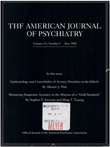Neuroendocrine effects of intravenous clomipramine in depressed patients and healthy subjects
Abstract
OBJECTIVE: Neuroendocrine challenge paradigms have been used to asses serotonergic systems in depression, but limitations in the specificity of many of these tests have been noted. In this study, the neuroendocrine responses to acute intravenous administration of the serotonin (5-HT) reuptake inhibitor clomipramine were assessed in depressed patients and matched control subjects. METHODS: Thirty hospitalized patients who met DSM-III-R criteria for major depression, and 30 healthy control subjects who were matched for age, sex, and season of year for the time of study, received 12.5 mg of intravenously administered clomipramine. RESULTS: The depressed patients demonstrated significant blunting of prolactin responses to clomipramine, as well as trends toward blunted ACTH and cortisol responses. There was no difference between the patient and control groups in growth hormone responses, plasma clomipramine levels, or self-reports of side effects. CONCLUSIONS: These data support the hypothesis that depressed patients have abnormal neuroendocrine responses to the intravenous administration of the 5-HT reuptake inhibitor clomipramine. Further study is required to delineate the mechanisms responsible for the abnormal response to intravenously administered clomipramine in depression.
Access content
To read the fulltext, please use one of the options below to sign in or purchase access.- Personal login
- Institutional Login
- Sign in via OpenAthens
- Register for access
-
Please login/register if you wish to pair your device and check access availability.
Not a subscriber?
PsychiatryOnline subscription options offer access to the DSM-5 library, books, journals, CME, and patient resources. This all-in-one virtual library provides psychiatrists and mental health professionals with key resources for diagnosis, treatment, research, and professional development.
Need more help? PsychiatryOnline Customer Service may be reached by emailing [email protected] or by calling 800-368-5777 (in the U.S.) or 703-907-7322 (outside the U.S.).



